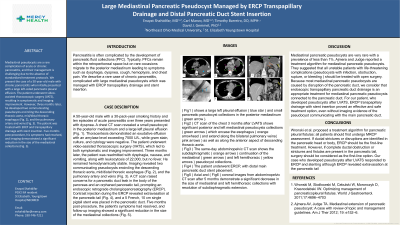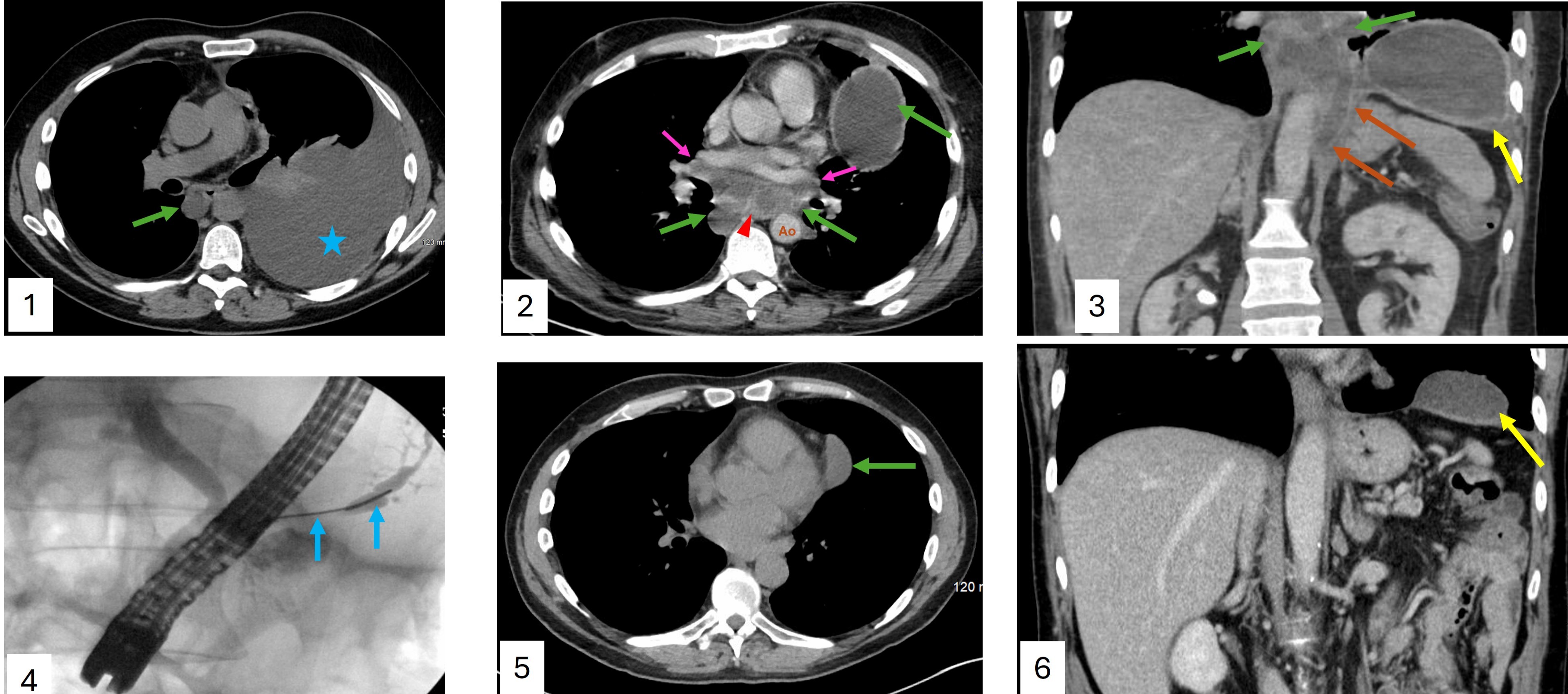Sunday Poster Session
Category: Biliary/Pancreas
P0195 - Large Mediastinal Pancreatic Pseudocyst Managed by ERCP Transpapillary Drainage and Distal Pancreatic Duct Stent Insertion
Sunday, October 27, 2024
3:30 PM - 7:00 PM ET
Location: Exhibit Hall E

Has Audio

Enayat Shahidifar, MD
St. Elizabeth Youngstown Hospital
YOUNGSTOWN, OH
Presenting Author(s)
Enayat Shahidifar, MD1, Carl Manzo, MD2, Timothy Barreiro, DO, MPH3, Jennifer McKay, PharmD1
1St. Elizabeth Youngstown Hospital, Youngstown, OH; 2Mercy Health-Belmont Gastroenterology, Youngstown, OH; 3Ohio University Heritage College of Osteopathic Medicine, Youngstown, OH
Introduction: Pancreatitis is often complicated by the development of pancreatic fluid collections (PFC). Typically, PFCs remain within the retroperitoneal space but on rare occasions migrate to the posterior mediastinum leading to symptoms such as dysphagia, dyspnea, cough, hemoptysis, and chest pain. We describe a rare case of chronic pancreatitis complicated with mediastinal pseudocysts, which was managed with ERCP transpapillary drainage and stent insertion.
Case Description/Methods: A 50-year-old male with a 30-pack-year smoking history and ten episodes of acute pancreatitis over three years, presented with shortness of breath and a chest CT scan revealing a small pseudocyst in the posterior mediastinum and large left pleural effusion (Fig1). Completed thoracentesis revealed an exudative effusion with an amylase level exceeding 7500 U/L. The fluid’s gram stain, culture, and cytology were negative. Three months after the last presentation, the patient was admitted with dysphagia, nausea, and vomiting. Imaging revealed two communicating pseudocysts encircling the descending thoracic aorta, mid/distal thoracic esophagus (Fig 2), and the pulmonary artery and veins (Fig3). CT imaging was concerning for pancreatic duct leak and orphaned pancreatic tail and ERCP was performed. During the ERCP, contrast injection revealed extravasation at the pancreatic tail (Fig 4). A 5 French,10 cm single pigtail stent was placed into the pancreatic duct. Five months after the procedure, the patient's symptoms had resolved and imaging showed a significant decrease in the size of the mediastinal collections (Fig 5).
Discussion: Mediastinal pancreatic pseudocysts are very rare with a prevalence of less than 1%. The primary treatment approach is drainage; however, the optimal management strategy is not well studied. Historically, open surgical treatment has been the most common approach. While endoscopic therapeutic techniques, such as transmural or transpapillary drainage, have been effectively used for abdominal pseudocysts, there are few reports of successful endoscopic resolution of mediastinal pseudocysts. In our patient, who was a poor candidate for surgery, ERCP transpapillary drainage with stent insertion proved to be an effective and safe treatment option, even in the absence of imaging evidence of the pseudocyst communicating with the main pancreatic duct.

Disclosures:
Enayat Shahidifar, MD1, Carl Manzo, MD2, Timothy Barreiro, DO, MPH3, Jennifer McKay, PharmD1. P0195 - Large Mediastinal Pancreatic Pseudocyst Managed by ERCP Transpapillary Drainage and Distal Pancreatic Duct Stent Insertion, ACG 2024 Annual Scientific Meeting Abstracts. Philadelphia, PA: American College of Gastroenterology.
1St. Elizabeth Youngstown Hospital, Youngstown, OH; 2Mercy Health-Belmont Gastroenterology, Youngstown, OH; 3Ohio University Heritage College of Osteopathic Medicine, Youngstown, OH
Introduction: Pancreatitis is often complicated by the development of pancreatic fluid collections (PFC). Typically, PFCs remain within the retroperitoneal space but on rare occasions migrate to the posterior mediastinum leading to symptoms such as dysphagia, dyspnea, cough, hemoptysis, and chest pain. We describe a rare case of chronic pancreatitis complicated with mediastinal pseudocysts, which was managed with ERCP transpapillary drainage and stent insertion.
Case Description/Methods: A 50-year-old male with a 30-pack-year smoking history and ten episodes of acute pancreatitis over three years, presented with shortness of breath and a chest CT scan revealing a small pseudocyst in the posterior mediastinum and large left pleural effusion (Fig1). Completed thoracentesis revealed an exudative effusion with an amylase level exceeding 7500 U/L. The fluid’s gram stain, culture, and cytology were negative. Three months after the last presentation, the patient was admitted with dysphagia, nausea, and vomiting. Imaging revealed two communicating pseudocysts encircling the descending thoracic aorta, mid/distal thoracic esophagus (Fig 2), and the pulmonary artery and veins (Fig3). CT imaging was concerning for pancreatic duct leak and orphaned pancreatic tail and ERCP was performed. During the ERCP, contrast injection revealed extravasation at the pancreatic tail (Fig 4). A 5 French,10 cm single pigtail stent was placed into the pancreatic duct. Five months after the procedure, the patient's symptoms had resolved and imaging showed a significant decrease in the size of the mediastinal collections (Fig 5).
Discussion: Mediastinal pancreatic pseudocysts are very rare with a prevalence of less than 1%. The primary treatment approach is drainage; however, the optimal management strategy is not well studied. Historically, open surgical treatment has been the most common approach. While endoscopic therapeutic techniques, such as transmural or transpapillary drainage, have been effectively used for abdominal pseudocysts, there are few reports of successful endoscopic resolution of mediastinal pseudocysts. In our patient, who was a poor candidate for surgery, ERCP transpapillary drainage with stent insertion proved to be an effective and safe treatment option, even in the absence of imaging evidence of the pseudocyst communicating with the main pancreatic duct.

Figure: ( Fig1 ) shows a large left pleural effusion ( blue star ) and small pancreatic pseudocyst collections in the posterior mediastinum ( green arrow ). ( Fig2 ) CT scan of the chest 3 months after LVATS shows significant posterior and left mediastinal pseudocysts collections ( green arrows ) which encase the esophagus ( orange arrowhead ) and extend along the bilateral pulmonary veins( pink arrows ) as well as along the anterior aspect of descending thoracic aorta. ( Fig3 ) The same-day abdominopelvic CT scan shows the subdiaphragmatic ( orange arrows ) continuation of the mediastinal ( green arrows ) and left hemithoracic ( yellow arrows ) pseudocyst collections.( Fig4 ) The patient underwent ERCP, with distal main pancreatic duct stent placement. ( Fig5 ) Axial and ( Fig6 ) coronal images from abdominopelvic CT scan after 5 months demonstrate a significant decrease in size of mediastinal and left hemithoracic collections with resolution of subdiaphragmatic extension.
Disclosures:
Enayat Shahidifar indicated no relevant financial relationships.
Carl Manzo indicated no relevant financial relationships.
Timothy Barreiro indicated no relevant financial relationships.
Jennifer McKay indicated no relevant financial relationships.
Enayat Shahidifar, MD1, Carl Manzo, MD2, Timothy Barreiro, DO, MPH3, Jennifer McKay, PharmD1. P0195 - Large Mediastinal Pancreatic Pseudocyst Managed by ERCP Transpapillary Drainage and Distal Pancreatic Duct Stent Insertion, ACG 2024 Annual Scientific Meeting Abstracts. Philadelphia, PA: American College of Gastroenterology.
